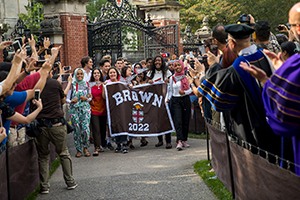Like many members of the Narragansett tribe, Sherenté Harris learned how to dance at powwows before he could walk. “When you’re a child, your mother carries you into the circle, bouncing you to the beat of the drum,” Harris said.
It’s no wonder, then, that Harris gravitated toward dance early in life, and even less surprising when considering his family history. Harris’ father is a world champion in Eastern War dance, a heavy, hunched-over dance typically associated with men in Northeastern Native American tribes. His mother has traveled internationally as a champion in Fancy Shawl, a traditionally female dance that demands grace, upright posture and attention to detail.
At first, Harris followed his father’s example, practicing Eastern War dance and entering competitions. But soon after coming out as two spirit — an indigenous term used to describe someone with a multi-gender identity — the teen found his true passion in Fancy Shawl dancing. After a year of practicing the fast-paced dance, Harris wanted to take part in competitions but was unsure whether he’d be accepted. Nonetheless he signed up to compete at an upcoming powwow.
“I was well aware going in that I might face a lot of backlash,” Harris said. “I was expecting to get completely kicked out of the powwow.”
What happened instead surprised him: After hearing the powwow committee’s decision not to let Harris compete, judges walked out in protest. The incident prompted calls for more two-spirit acceptance in indigenous communities across the United States and led many tribes to change their competition gender policies.
Harris saw the experience as a chance to give contemporary indigenous culture more visibility among the non-Native Americans who had followed his story. These days, Harris is using art, rather than dance, to bring more awareness to Native issues. This week, he began studies in the Brown-RISD dual-degree program, where in the next five years he’ll explore the intersection of drawing and indigeneity. He has plans to dig into the John Carter Brown Library’s archives on the Narragansett tribe and to continue working to preserve the Narragansett language.
“The next five years are going to give me the opportunity not only to hone my artistic and academic skills, but also to reach out to Rhode Islanders who may be unaware of the issues indigenous people face, from poverty to alcohol and drug abuse to domestic violence,” Harris said. “My acceptance into Brown felt like an acceptance for the whole Narragansett tribe.”
